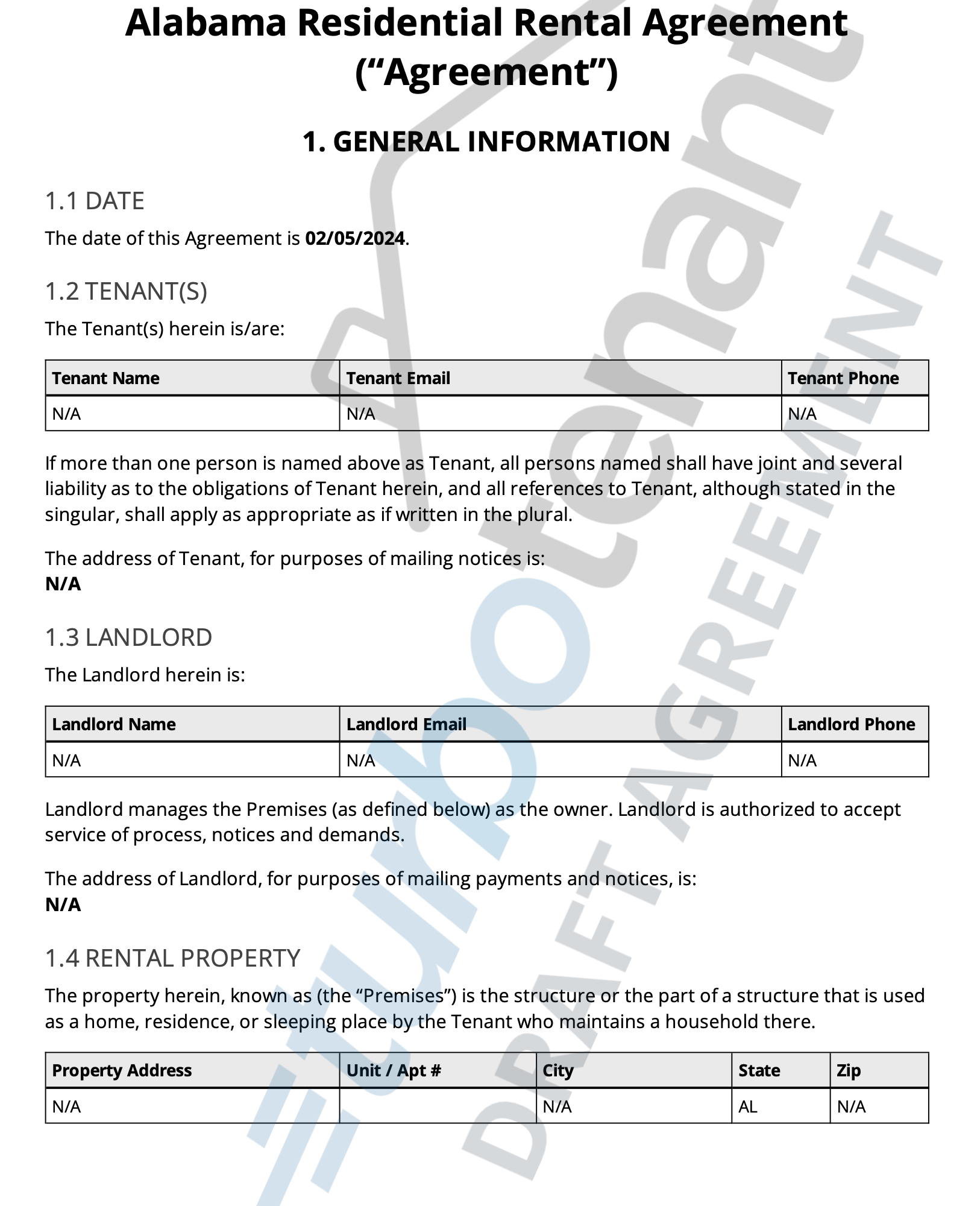
Navigating the intricacies of Alabama lease agreements requires a comprehensive understanding of both state-specific regulations and best practices in property leasing. TurboTenant’s Lease Agreement Generator and Templates offer a streamlined solution for landlords, making it simpler to create legally compliant and clear lease agreements tailored to the unique demands of renting out properties in Alabama. This article outlines the essential components and legal requirements of an Alabama lease agreement, ensuring landlords and tenants are well-informed and protected throughout the leasing process.
Section 1 – Custom to You
The initial section of an Alabama lease agreement focuses on the specifics of the rental arrangement. Here, landlords input details such as the parties involved, rent amount, utility responsibilities, and any additional property-specific rules or requirements. This customization ensures that the lease accurately reflects the unique aspects of the rental situation.
Key Customizable Elements
- Additional Provisions: This area allows landlords to add any specific rules or requirements related to their property. It’s vital to consult a lawyer to ensure these provisions comply with Alabama laws.
- Lost Key Policy: Should tenants fail to return all keys upon moving out, they are responsible for covering the full cost of rekeying the property.
Section 2 – Specific to Alabama
Alabama-specific clauses are included to ensure compliance with local laws. These provisions cover critical areas such as late fees, security deposit requirements, occupancy limits, repair notifications, and policies on changing locks.
Notable Alabama Regulations
- Late Fees (Section 2.1): In Alabama, landlords may charge a late fee of 10% of the unpaid rent if it’s not paid in full by 5:00 pm on the 2nd of each month.
- Security Deposit Provisions (Section 2.4): Alabama landlords can request a security deposit up to one month’s rent, with additional deposits allowed for pets, changes to premises, or increased liability risks. Security deposits must be returned within 60 days of lease termination, with an itemized statement for any deductions.
- Occupancy Limits and Guests (Section 2.5): The lease specifies that only named tenants and additional occupants (dependents) may reside in the property, with guests allowed for up to 15 days every six months.
- Notification of Repairs (Section 2.7): Tenants are responsible for repair costs due to misuse or negligence and must promptly report serious issues. Landlords are obligated to address repairs necessary for a healthy and safe living environment.
- Notifying of Absences (Section 2.9): Tenants must inform landlords if they will be away from the property for more than 7 days, allowing landlords to check the property in their absence.
- Changing Locks (Section 2.12): Tenants must request in writing to change locks or security devices, at their own expense but installed by the landlord.
Section 3 – General Clauses for Best Practices
This section includes standard clauses found in most lease agreements, emphasizing best practices in landlord-tenant relationships. These provisions address issues like subletting, property alterations, choice of law, and adherence to laws and local ordinances.
Key General Clauses
- Subletting (Section 3.1): Subleasing the property without the landlord’s written permission is prohibited.
- Altering or Improving the Property (Section 3.2): Tenants cannot make alterations or improvements without the landlord’s written consent. The property must be returned in its original condition upon move-out.
- Choice of Law (Section 3.11): The lease agreement is governed by Alabama law, with disputes subject to the jurisdiction of county courts where the property is located.
- Follow the Law (Section 3.14): Tenants must not violate any laws or ordinances while on the property and must not be a nuisance to neighbors.

FAQ
Can landlords charge for a lost key in Alabama?
Yes, landlords can include a provision requiring tenants to cover the cost of rekeying the property if they fail to return all keys upon moving out.
How much can a landlord charge for a security deposit in Alabama?
Landlords in Alabama may request a security deposit up to one month’s rent, with additional allowances for pets, changes to the premises, or increased liability risks.
Are tenants responsible for repairs in Alabama?
Tenants are responsible for repairs due to their misuse or negligence and must promptly report any serious issues. Landlords are required to address repairs necessary for maintaining a healthy and safe living environment.
TurboTenant Alabama Lease Agreements
TurboTenant simplifies the process of creating Alabama-specific lease agreements, ensuring compliance with state laws and best practices in property leasing. By utilizing TurboTenant’s Lease Agreement Generator and Templates, landlords are equipped to draft clear and comprehensive leases, protecting their interests and fostering positive landlord-tenant relationships. For landlords in Alabama, consulting with a legal professional is recommended for any custom provisions to ensure they align with state regulations and do not conflict with other lease terms.
Alabama Resources

